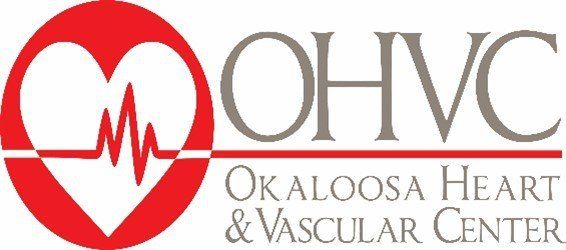SCHEDULE AN APPOINTMENT TODAY • (850) 682-7212
Conditions
...
WHAT WE TREAT
Certified Cardiologists SERVING the Crestview & Destin, FL Areas
Your heart health is our priority at Okaloosa Heart & Vascular Center. As a leading provider of specialized cardiovascular care in the Crestview, Destin, Fort Walton Beach, and Niceville, FL area, we are committed to delivering comprehensive, patient-focused treatment. Our patients appreciate spending time in our state-of-the-art facilities with our compassionate staff. With cutting-edge technology and a team of experienced cardiologists on hand to attend to your needs, we strive to provide accurate diagnoses and effective treatments that are tailored to your unique needs. Whether you are seeking preventative care or advanced cardiovascular intervention, you can trust us to guide you every step of the way.
Read on to learn more about the conditions that we can treat:
CARDIAC ARRHYTHMIAS
Your heart has an electrical system that causes it to beat. A change to this normal electrical activation is an “arrhythmia.” This can be a slow heart rate, rapid heart rate, or an irregular rhythm. Cardiac arrhythmias are quite common - more than 3 million people in the United States are affected by an arrhythmia each year. Examples include bradycardia (slow heart rate), tachycardia (fast heart rate), atrial fibrillation, atrial flutter, and others. Arrhythmias may cause the heart to pump less effectively, cause symptoms such as fatigue, shortness of breath, lightheadedness and dizziness. Importantly, arrhythmias can lead to life threatening conditions such as congestive heart failure, stroke and death.
ATRIAL FIBRILLATION
Atrial Fibrillation (also called AFib or AF) is the most common arrhythmia in adults, characterized by an irregular and often rapid heartbeat. In a normally beating heart, the top two chambers of the heart squeeze blood to the bottom two chambers in a regular and coordinated fashion. In AFib, the upper chambers (atria) of the heart beat experience an “electrical storm” that causes them to quiver in an uncoordinated fashion, referred to as "fibrillation."
Atrial fibrillation often causes patients to feel poorly, but in some patients may cause no symptoms at all! Common symptoms include fatigue, palpitations (an awareness of heartbeat), dizziness or lightheadedness, shortness of breath during exercising, and anxiety. About 15-30% of patients, however, are unaware of their AFib.
We treat AFib to reduce the risk of stroke, decrease negative symptoms, and improve the quality of life of our patients. We use a comprehensive approach factoring in lifestyle changes, medication, and medical procedures and devices such as catheter ablation, cardioversion, pacemaker implantation, and Watchman FLX implantation, among others. Notably, AFib is a chronic, progressive disease which, if left untreated, generally progresses to permanent AFib. Atrial fibrillation can lead to life threatening conditions such as congestive heart failure, stroke and death.
ATRIAL FLUTTER
Atrial flutter is another common abnormal heart rhythm involving the top chambers of the heart. 50% of patients with atrial flutter will progress to atrial fibrillation (AFib), so timely diagnosis and correction of atrial flutter is generally indicated. Like AFib, atrial flutter lead to life threatening conditions such as congestive heart failure, stroke and death. Our care team provides a range of options to treat atrial flutter, including curative catheter ablation.
SUPRAVENTRICULAR TACHYCARDIA
Supraventricular tachycardia (SVT) is generally a benign condition but in some cases can be associated with sudden cardiac death. It is seen in children and adults, and usually associated with rapid heart fluttering and lightheadedness, shortness of breath and weakness. Diagnosis and treatment is carried out promptly.
BRADYCARDIA
Slow heart rates can be due to Sinus Node Dysfunction (Sick Sinus Syndrome), or block of electrical conduction in the atrioventricular node (AV block). Both conditions can cause fatigue, lightheadedness, passing out (syncope) and death. Implantation of a pacemaker is a routine procedure that can improve quality of life and reduce the likelihood of adverse events.
VENTRICULAR TACHYCARDIA
Ventricular Tachycardia and Ventricular Fibrillation are life threatening arrhythmias that originate from the lower pumping chambers of the heart (ventricles). These arrhythmias generally require emergent attention and longitudinal care. Treatments for these conditions include medical therapy, internal cardioverter defibrillator (ICD) implantation and catheter ablation.
CONTACT OUR CARDIOLOGIST TODAY
At Okaloosa Heart & Vascular Center, we understand that managing heart conditions can feel overwhelming. That's why we're here to provide the experienced care and guidance you need. Knowing that your heart condition is under control, especially if you have a family history of heart disease or have suffered from related in the past, can make a huge difference to your overall mental and physical health. Whether you’re dealing with atrial fibrillation, arrhythmias, or other heart concerns, our skilled cardiologists have the experience and equipment to perform advanced procedures that are designed to help you achieve better heart health. From atrial fibrillation ablation to pacemaker implantation, we offer the services and therapies you need to take control of your cardiovascular well-being. Don’t wait to prioritize your health; contact our office today to schedule a consultation and take the first step toward a healthier heart.
DESTIN
36468 Emerald Coast Pkwy Ste 1101
Destin, FL 32541
NICEVILLE
552 Twin Cities Blvd Ste A
Niceville, FL 32578
FORT WALTON BEACH
1032 Mar Walt Dr Unit 110
Fort Walton Beach, FL 32547
Get Directions
Proudly Serving Fort Walton Beach, Navarre, Gulf Breeze, Destin, Miramar Beach, Chipley, Panama City, Freeport, DeFuniak Springs, Crestview, Milton, Pace, Valparaiso, Shalimar, Marianna, Andalusia, Opp, Brewton, Lynn Haven, Niceville, and the Surrounding Areas

